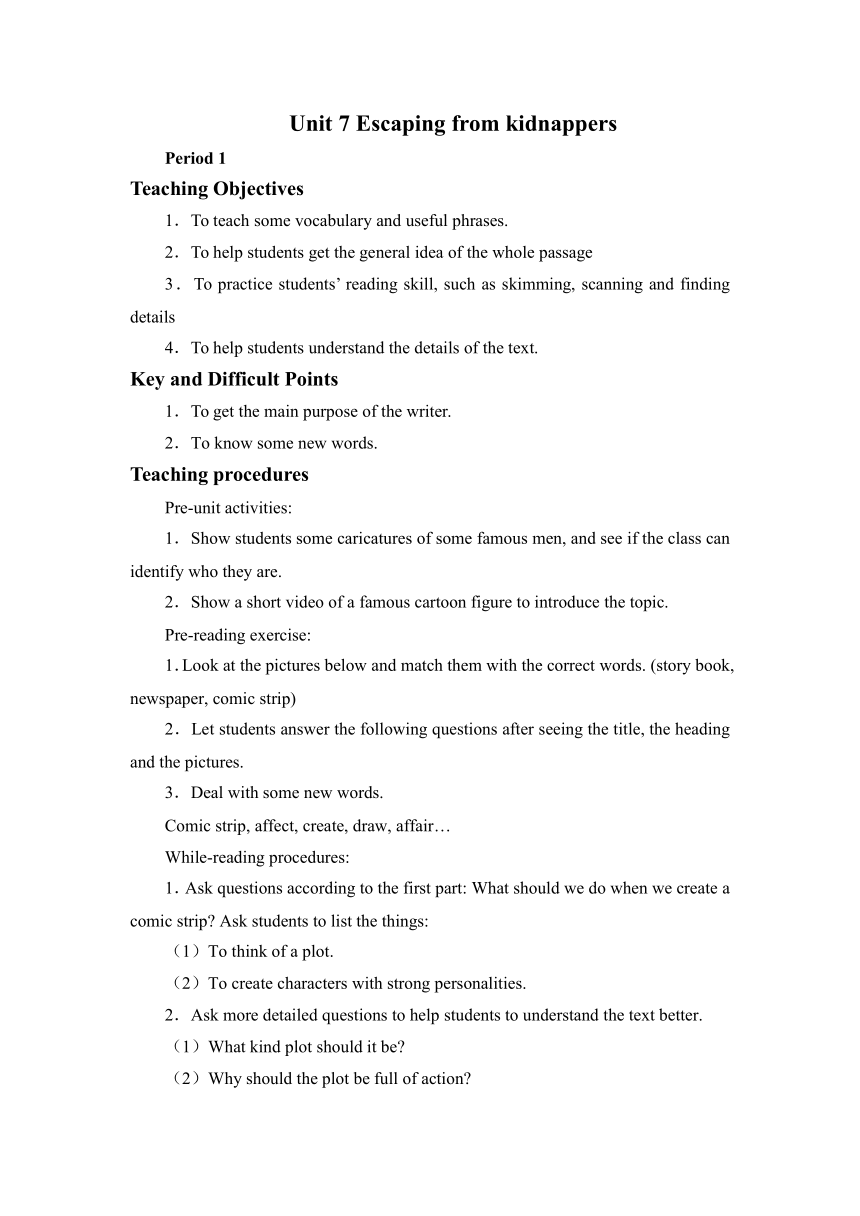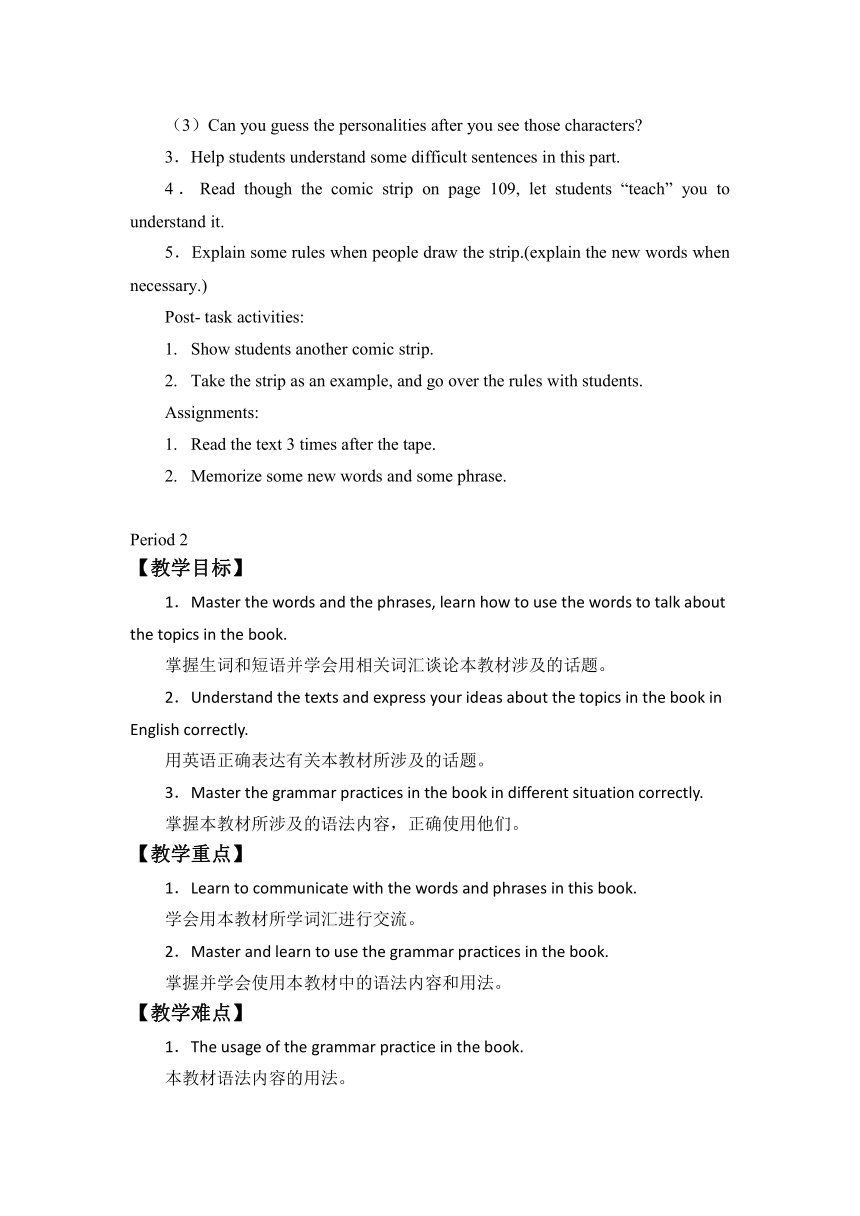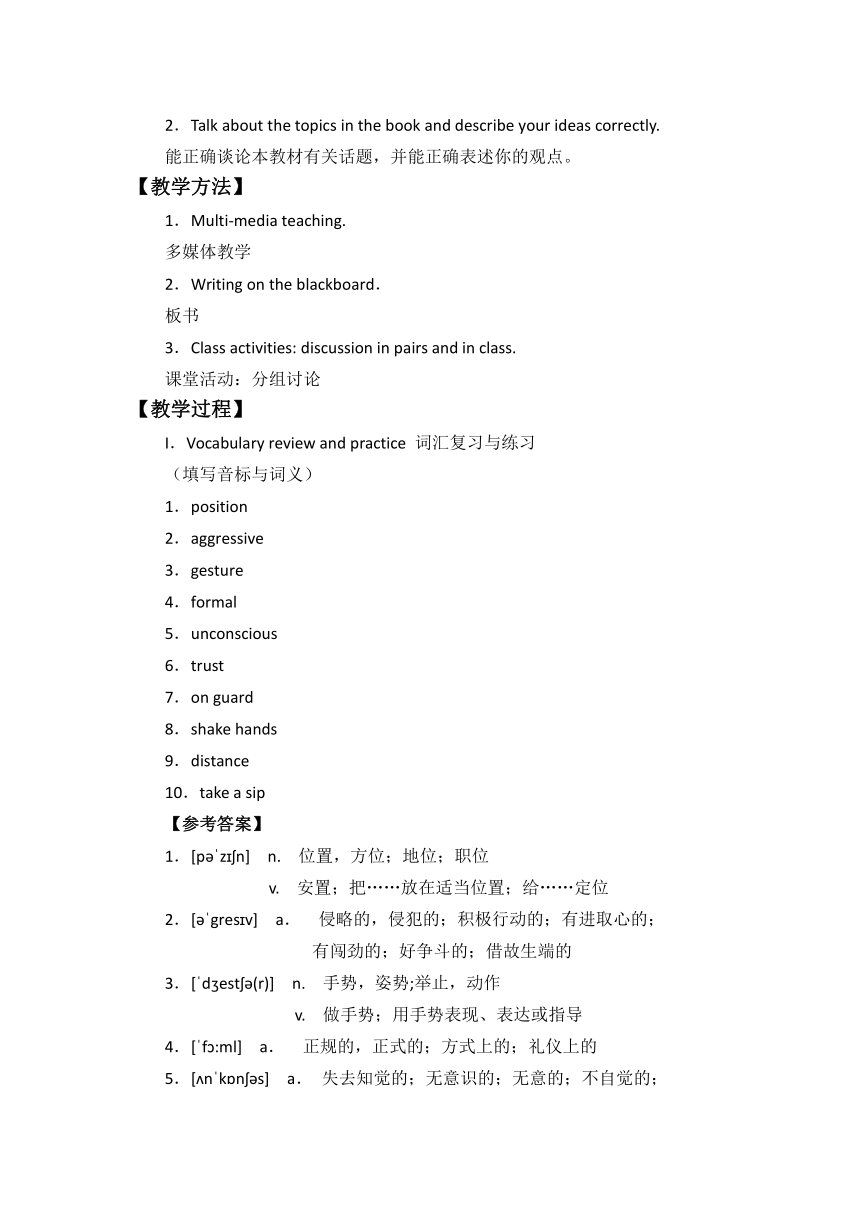牛津上海版英语九年级上册 Module 3 Unit7 Escaping from kidnappers 教案(2课时)
文档属性
| 名称 | 牛津上海版英语九年级上册 Module 3 Unit7 Escaping from kidnappers 教案(2课时) |  | |
| 格式 | docx | ||
| 文件大小 | 25.8KB | ||
| 资源类型 | 教案 | ||
| 版本资源 | 牛津上海版(试用本) | ||
| 科目 | 英语 | ||
| 更新时间 | 2022-08-29 17:12:29 | ||
图片预览



文档简介
Unit 7 Escaping from kidnappers
Period 1
Teaching Objectives
1.To teach some vocabulary and useful phrases.
2.To help students get the general idea of the whole passage
3.To practice students’ reading skill, such as skimming, scanning and finding details
4.To help students understand the details of the text.
Key and Difficult Points
1.To get the main purpose of the writer.
2.To know some new words.
Teaching procedures
Pre-unit activities:
1.Show students some caricatures of some famous men, and see if the class can identify who they are.
2.Show a short video of a famous cartoon figure to introduce the topic.
Pre-reading exercise:
1.Look at the pictures below and match them with the correct words. (story book, newspaper, comic strip)
2.Let students answer the following questions after seeing the title, the heading and the pictures.
3.Deal with some new words.
Comic strip, affect, create, draw, affair…
While-reading procedures:
1.Ask questions according to the first part: What should we do when we create a comic strip Ask students to list the things:
(1)To think of a plot.
(2)To create characters with strong personalities.
2.Ask more detailed questions to help students to understand the text better.
(1)What kind plot should it be
(2)Why should the plot be full of action
(3)Can you guess the personalities after you see those characters
3.Help students understand some difficult sentences in this part.
4.Read though the comic strip on page 109, let students “teach” you to understand it.
5.Explain some rules when people draw the strip.(explain the new words when necessary.)
Post- task activities:
Show students another comic strip.
Take the strip as an example, and go over the rules with students.
Assignments:
Read the text 3 times after the tape.
Memorize some new words and some phrase.
Period 2
【教学目标】
1.Master the words and the phrases, learn how to use the words to talk about the topics in the book.
掌握生词和短语并学会用相关词汇谈论本教材涉及的话题。
2.Understand the texts and express your ideas about the topics in the book in English correctly.
用英语正确表达有关本教材所涉及的话题。
3.Master the grammar practices in the book in different situation correctly.
掌握本教材所涉及的语法内容,正确使用他们。
【教学重点】
1.Learn to communicate with the words and phrases in this book.
学会用本教材所学词汇进行交流。
2.Master and learn to use the grammar practices in the book.
掌握并学会使用本教材中的语法内容和用法。
【教学难点】
1.The usage of the grammar practice in the book.
本教材语法内容的用法。
2.Talk about the topics in the book and describe your ideas correctly.
能正确谈论本教材有关话题,并能正确表述你的观点。
【教学方法】
1.Multi-media teaching.
多媒体教学
2.Writing on the blackboard.
板书
3.Class activities: discussion in pairs and in class.
课堂活动:分组讨论
【教学过程】
I.Vocabulary review and practice 词汇复习与练习
(填写音标与词义)
1.position
2.aggressive
3.gesture
4.formal
5.unconscious
6.trust
7.on guard
8.shake hands
9.distance
10.take a sip
【参考答案】
1.[p z n] n. 位置,方位;地位;职位
v. 安置;把……放在适当位置;给……定位
[ gres v] a. 侵略的,侵犯的;积极行动的;有进取心的;
有闯劲的;好争斗的;借故生端的
[ d est (r)] n. 手势,姿势;举止,动作
v. 做手势;用手势表现、表达或指导
4.[ f :ml] a. 正规的,正式的;方式上的;礼仪上的
5.[ n k n s] a. 失去知觉的;无意识的;无意的;不自觉的;
不知道的;不受意识控制的
6.[tr st] v. 相信;信任;对……有信心
n. 信任;信托
7.[ n ɡɑ:d] 警戒;提防;警惕;站岗;防备……
8.[ e k h ndz] 握手
9.[ dist ns] n. 距离;远处;路程;(时间的)间隔
v. 把……远远甩在后面;疏远;与……保持距离
10.[te k s p] 小喝一口;喝一小口;一小口
II. Explain the following words in English. 用英语解释下列词语
1.communicate
2.spread
3.gesture
4.aggressive
5.performance
6.formal
7.infectious
8.traditionally
9.threatening
10.involve
【参考答案】
1.communicate transmit thoughts or feelings; transmit information
2.spread act of extending over a wider scope or expanse of space or time
3.gesture motion of hands or body to emphasize or help to express a thought or feeling
4.aggressive having or showing determination and energetic pursuit of your ends
5.performance the act of presenting a play or other entertainment
6.formal being in accord with established forms and requirements
7.infectious caused by infection or capable of causing infection
8.traditionally according to tradition
9.threatening foreshadowing evil or tragic developments
10.involve occupy or engage the interest of
III.Key words and phrases 重点词汇与短语
position n. 位置,方位;地位;职位
v. 安置;把……放在适当位置;给……定位
take a position 采取某个立场
take a moderate position 采取中间立场
take a leadership position 占据领导地位
take up a position 担任某职务
unconscious a. 失去知觉的;无意识的;无意的;不自觉的;不受意识控制的
unconscious of sb./sth. 未察觉;未意识到
conscious [ k n s] adj. 有意识的,神志清醒的;自觉的;有意的
shake hands 握手
shake one’s head 摇头(不同意)
nod one’s head 点头(同意)
in the distance 在远处,在很远的那边
body language 身体语言;手势语言;肢体语言
make a deal 成交;达成交易
make a deal with 与……做生意;和……妥协
hold up 举起;支撑;耽搁;持械抢劫
hold up one’s hand 举起手
hold up as a model 奉为楷模
give away 泄露;赠送;失去
give in 让步;屈服;投降
give up 放弃;把……让给;戒除
give oneself up 自首;投案;束手待毙
show sb. the way 给……指路
IV. Grammar 语法
Review the usage of adverbial clause of condition and adverbial clause of concession. 复习条件状语从句和让步状语从句的用法
1.条件状语从句
条件状语从句用于表示主句谓语动词所表示的动作产生的条件。常用的引导词有:if(假如,如果);unless(除非,若不,除非在……的时候);as/so long as(只要……,就……);only if(除非,只要……就,只有,只有当……);supposing(如果,假如);in case(以防,万一);on condition (that)...(在条件……下,引导的条件从句是主句事件发生的前提条件或唯一条件)。
在条件状语从句中,用一般现在时代替一般将来时。
(1)As long as you promise to come, I’ll wait for you until you come.
只要你答应, 我就等你来。
(2)You can make progress only if you are modest.
只有虚心,才能进步。
(3)Don't forget to take your umbrella in case it rains.
别忘了带伞,以防下雨。
(4)Supposing it rains tomorrow, shall we have the sports meeting
假如明天下雨, 我们还会开动会吗?
2.让步状语从句
让步状语从句表示在某种相反的条件下,主句中的情况依然会出现。有时要用部分倒装结构。常用的引导词有:though/although(虽然,尽管,但是,然而);even if/even though(即使,纵然);as(尽管);in spite of(不顾;虽然;尽管……);以及“no matter + 疑问词”或“疑问词 + 后缀ever” 等。让步状语从句可以放在主句前或主句后。
(1)Although she has a lot of money, yet (still) she is not happy.
尽管她很有钱,然而她并不快乐。
(2)Even if it rains tomorrow, I won't change my plan.
即使明天下雨,我也不会改变计划。
(3)as引导让步状语从句时需要倒装。
Child as he is, he knows a lot.(名词提前)
尽管他是个孩子,他却懂得很多。
Improbable as it seems, it's true.(形容词提前)
虽然看起来不太可能,但却是真的。
Raining hard as it is, I'm going out for a walk.(分词短语提前)
尽管下着大雨,我还是要出去走走。
(4)“no matter + 疑问词”或“疑问词 + 后缀ever”
no matter what = whatever
no matter who = whoever
no matter when = whenever
no matter where = wherever
no matter which = whichever
no matter how = however
No matter what happened, he would not mind.
= Whatever happened, he would not mind.
无论发生什么事,他都不会介意的。
No matter how (what, when, which, who, where) ...
无论怎样(什么,什么时候,哪一个,是谁,什么地方)……。
注意:no matter ... 不能引导主语从句和宾语从句。
V.Sum up
In today’s class, we’ve reviewed key words and phrases and the grammar in the unit three. We should put what we reviewed in our mind and practice after class so that we can make great progress in English learning.
今天,我们复习了第三单元的重点词汇与语法项目,希望同学们在课后多加练习从而在英语学习方面取得更大的进步。
【作业布置】
1.Review the usage of the words we reviewed today with a dictionary or on line.
2.Finish the exercises and prepare the unit four.
Period 1
Teaching Objectives
1.To teach some vocabulary and useful phrases.
2.To help students get the general idea of the whole passage
3.To practice students’ reading skill, such as skimming, scanning and finding details
4.To help students understand the details of the text.
Key and Difficult Points
1.To get the main purpose of the writer.
2.To know some new words.
Teaching procedures
Pre-unit activities:
1.Show students some caricatures of some famous men, and see if the class can identify who they are.
2.Show a short video of a famous cartoon figure to introduce the topic.
Pre-reading exercise:
1.Look at the pictures below and match them with the correct words. (story book, newspaper, comic strip)
2.Let students answer the following questions after seeing the title, the heading and the pictures.
3.Deal with some new words.
Comic strip, affect, create, draw, affair…
While-reading procedures:
1.Ask questions according to the first part: What should we do when we create a comic strip Ask students to list the things:
(1)To think of a plot.
(2)To create characters with strong personalities.
2.Ask more detailed questions to help students to understand the text better.
(1)What kind plot should it be
(2)Why should the plot be full of action
(3)Can you guess the personalities after you see those characters
3.Help students understand some difficult sentences in this part.
4.Read though the comic strip on page 109, let students “teach” you to understand it.
5.Explain some rules when people draw the strip.(explain the new words when necessary.)
Post- task activities:
Show students another comic strip.
Take the strip as an example, and go over the rules with students.
Assignments:
Read the text 3 times after the tape.
Memorize some new words and some phrase.
Period 2
【教学目标】
1.Master the words and the phrases, learn how to use the words to talk about the topics in the book.
掌握生词和短语并学会用相关词汇谈论本教材涉及的话题。
2.Understand the texts and express your ideas about the topics in the book in English correctly.
用英语正确表达有关本教材所涉及的话题。
3.Master the grammar practices in the book in different situation correctly.
掌握本教材所涉及的语法内容,正确使用他们。
【教学重点】
1.Learn to communicate with the words and phrases in this book.
学会用本教材所学词汇进行交流。
2.Master and learn to use the grammar practices in the book.
掌握并学会使用本教材中的语法内容和用法。
【教学难点】
1.The usage of the grammar practice in the book.
本教材语法内容的用法。
2.Talk about the topics in the book and describe your ideas correctly.
能正确谈论本教材有关话题,并能正确表述你的观点。
【教学方法】
1.Multi-media teaching.
多媒体教学
2.Writing on the blackboard.
板书
3.Class activities: discussion in pairs and in class.
课堂活动:分组讨论
【教学过程】
I.Vocabulary review and practice 词汇复习与练习
(填写音标与词义)
1.position
2.aggressive
3.gesture
4.formal
5.unconscious
6.trust
7.on guard
8.shake hands
9.distance
10.take a sip
【参考答案】
1.[p z n] n. 位置,方位;地位;职位
v. 安置;把……放在适当位置;给……定位
[ gres v] a. 侵略的,侵犯的;积极行动的;有进取心的;
有闯劲的;好争斗的;借故生端的
[ d est (r)] n. 手势,姿势;举止,动作
v. 做手势;用手势表现、表达或指导
4.[ f :ml] a. 正规的,正式的;方式上的;礼仪上的
5.[ n k n s] a. 失去知觉的;无意识的;无意的;不自觉的;
不知道的;不受意识控制的
6.[tr st] v. 相信;信任;对……有信心
n. 信任;信托
7.[ n ɡɑ:d] 警戒;提防;警惕;站岗;防备……
8.[ e k h ndz] 握手
9.[ dist ns] n. 距离;远处;路程;(时间的)间隔
v. 把……远远甩在后面;疏远;与……保持距离
10.[te k s p] 小喝一口;喝一小口;一小口
II. Explain the following words in English. 用英语解释下列词语
1.communicate
2.spread
3.gesture
4.aggressive
5.performance
6.formal
7.infectious
8.traditionally
9.threatening
10.involve
【参考答案】
1.communicate transmit thoughts or feelings; transmit information
2.spread act of extending over a wider scope or expanse of space or time
3.gesture motion of hands or body to emphasize or help to express a thought or feeling
4.aggressive having or showing determination and energetic pursuit of your ends
5.performance the act of presenting a play or other entertainment
6.formal being in accord with established forms and requirements
7.infectious caused by infection or capable of causing infection
8.traditionally according to tradition
9.threatening foreshadowing evil or tragic developments
10.involve occupy or engage the interest of
III.Key words and phrases 重点词汇与短语
position n. 位置,方位;地位;职位
v. 安置;把……放在适当位置;给……定位
take a position 采取某个立场
take a moderate position 采取中间立场
take a leadership position 占据领导地位
take up a position 担任某职务
unconscious a. 失去知觉的;无意识的;无意的;不自觉的;不受意识控制的
unconscious of sb./sth. 未察觉;未意识到
conscious [ k n s] adj. 有意识的,神志清醒的;自觉的;有意的
shake hands 握手
shake one’s head 摇头(不同意)
nod one’s head 点头(同意)
in the distance 在远处,在很远的那边
body language 身体语言;手势语言;肢体语言
make a deal 成交;达成交易
make a deal with 与……做生意;和……妥协
hold up 举起;支撑;耽搁;持械抢劫
hold up one’s hand 举起手
hold up as a model 奉为楷模
give away 泄露;赠送;失去
give in 让步;屈服;投降
give up 放弃;把……让给;戒除
give oneself up 自首;投案;束手待毙
show sb. the way 给……指路
IV. Grammar 语法
Review the usage of adverbial clause of condition and adverbial clause of concession. 复习条件状语从句和让步状语从句的用法
1.条件状语从句
条件状语从句用于表示主句谓语动词所表示的动作产生的条件。常用的引导词有:if(假如,如果);unless(除非,若不,除非在……的时候);as/so long as(只要……,就……);only if(除非,只要……就,只有,只有当……);supposing(如果,假如);in case(以防,万一);on condition (that)...(在条件……下,引导的条件从句是主句事件发生的前提条件或唯一条件)。
在条件状语从句中,用一般现在时代替一般将来时。
(1)As long as you promise to come, I’ll wait for you until you come.
只要你答应, 我就等你来。
(2)You can make progress only if you are modest.
只有虚心,才能进步。
(3)Don't forget to take your umbrella in case it rains.
别忘了带伞,以防下雨。
(4)Supposing it rains tomorrow, shall we have the sports meeting
假如明天下雨, 我们还会开动会吗?
2.让步状语从句
让步状语从句表示在某种相反的条件下,主句中的情况依然会出现。有时要用部分倒装结构。常用的引导词有:though/although(虽然,尽管,但是,然而);even if/even though(即使,纵然);as(尽管);in spite of(不顾;虽然;尽管……);以及“no matter + 疑问词”或“疑问词 + 后缀ever” 等。让步状语从句可以放在主句前或主句后。
(1)Although she has a lot of money, yet (still) she is not happy.
尽管她很有钱,然而她并不快乐。
(2)Even if it rains tomorrow, I won't change my plan.
即使明天下雨,我也不会改变计划。
(3)as引导让步状语从句时需要倒装。
Child as he is, he knows a lot.(名词提前)
尽管他是个孩子,他却懂得很多。
Improbable as it seems, it's true.(形容词提前)
虽然看起来不太可能,但却是真的。
Raining hard as it is, I'm going out for a walk.(分词短语提前)
尽管下着大雨,我还是要出去走走。
(4)“no matter + 疑问词”或“疑问词 + 后缀ever”
no matter what = whatever
no matter who = whoever
no matter when = whenever
no matter where = wherever
no matter which = whichever
no matter how = however
No matter what happened, he would not mind.
= Whatever happened, he would not mind.
无论发生什么事,他都不会介意的。
No matter how (what, when, which, who, where) ...
无论怎样(什么,什么时候,哪一个,是谁,什么地方)……。
注意:no matter ... 不能引导主语从句和宾语从句。
V.Sum up
In today’s class, we’ve reviewed key words and phrases and the grammar in the unit three. We should put what we reviewed in our mind and practice after class so that we can make great progress in English learning.
今天,我们复习了第三单元的重点词汇与语法项目,希望同学们在课后多加练习从而在英语学习方面取得更大的进步。
【作业布置】
1.Review the usage of the words we reviewed today with a dictionary or on line.
2.Finish the exercises and prepare the unit four.
